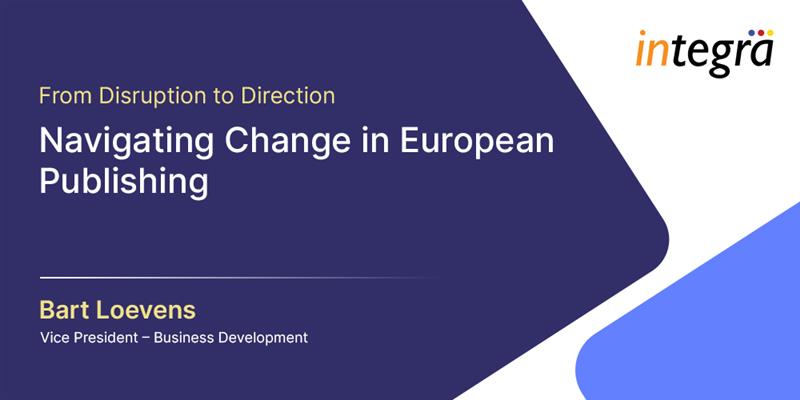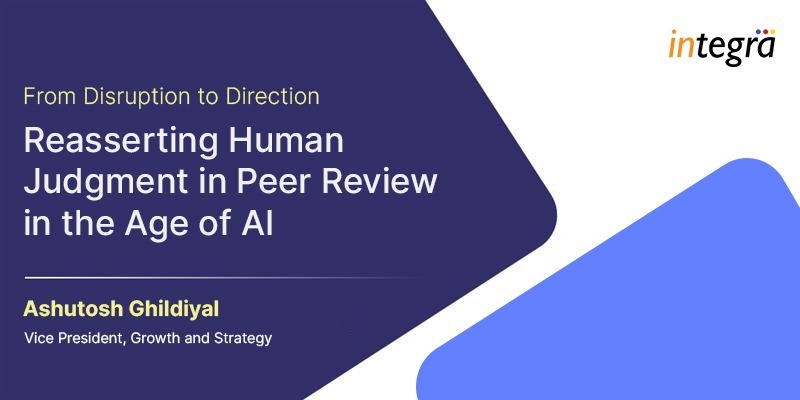From Disruption to Direction: Navigating Change in European Publishing

A Reflection on Transformation, Opportunity, and the Path Forward
Over the last few months, across strategy sessions, publishing conferences like APE and SSP, hallway conversations, and countless Zoom calls, I’ve sensed a powerful shift in the conversations we’re having as an industry.
When I began my journey in publishing, things felt more operational than strategic. The focus was on scale and execution, how to meet deadlines, track submissions, and move content through the system. Now, the conversation is about purpose. About resilience. About how we, as publishing professionals, can evolve, innovate, and lead through disruption.
This is no longer just about managing change, it’s about directing it. And this moment, despite its uncertainties, is filled with potential.
From Compliance to Culture: Accessibility as a Strategic Imperative
The European Accessibility Act (EAA) is one of the most profound catalysts of change I’ve seen in recent years. Initially, many publishers viewed it as just another regulatory hurdle, something to be ticked off a compliance checklist. But what’s been deeply rewarding is seeing that mindset shift.
As we’ve helped publishers across Europe retrofit legacy content, embed accessibility into design processes, and adopt AI-powered remediation tools, something greater has emerged: a recognition that accessibility is about inclusion.
When we structure content for assistive technologies, we’re not just checking a box, we’re opening up our content to broader audiences, enabling new modes of discovery, learning, and engagement. Educational publishers especially have started to see accessible design as something that benefits all learners, not just those with documented disabilities.
One experience I won’t forget is working with a European educational publisher who had initially approached accessibility from a compliance standpoint. But as we collaborated, their internal teams became champions of inclusive design. They started running accessibility workshops, revising templates, and even launched an initiative to train authors on writing for inclusion. Watching that cultural transformation was a reminder that regulation, when approached thoughtfully, can be a trigger for real innovation.
Automation, AI, and Reimagining Publishing Workflows
When I started out, “digital transformation” was the industry buzzword. Today, it’s the reality.
What I find encouraging is that publishers are no longer hesitant or skeptical about AI, they’re engaged. They’re asking how to use it strategically, not if they should. Whether it’s automating metadata tagging, adapting content for multiple formats, or reducing peer review turnaround times, AI is now embedded in the strategic fabric of publishing.
And what matters most is how we apply it.
A publisher I worked with recently used AI to cut peer review processing time by 30%, not by replacing editors, but by giving them better tools, automated reviewer suggestions, manuscript flagging, and even tone-checking in correspondence. The editorial team told me they felt empowered, not replaced. That’s what I mean when I say AI should amplify human intelligence, not substitute it.
At Integra, we’ve always believed that automation should enhance workflows while protecting quality. That’s why we design tools that don’t just automate, they advise, assist, and adapt.
A Multilingual View: Understanding Europe’s Nuances
Leading a multilingual team has deepened my connection with publishers across the region. Language is more than a tool for communication, it carries culture, context, and comfort. The publishing world is relationship-driven. When we meet with a German scholarly publisher and can speak their language, or when I join a Dutch team’s whiteboard session and catch the humor in their references, it’s not just a courtesy, it’s a strategic advantage.
These nuances shape how publishers approach transformation. The UK market often leads on Open Access, AI, and commercial agility. German publishers, by contrast, prioritize longevity, regulatory compliance, and institutional partnerships. Dutch publishers? They’re incredibly entrepreneurial and open to experimentation.
This diversity is what makes the European publishing landscape so exciting, and so complex. That’s why our solutions at Integra are built for flexibility: core platforms with regional customizations, processes that adapt to cultural expectations, and teams that speak the local publishing language, literally and figuratively.
Conversations that Shape Strategy
Industry conferences have always been a rich source of insight for me, not just the panels and keynotes, but the quieter moments. It’s over coffee or in a corridor that the real concerns often surface. At the APE conference in Berlin, I remember an informal conversation where a publisher voiced concerns about AI compromising research integrity. That brief exchange led to a longer strategy discussion on how transparency, audit trails, and human oversight could be built into automated peer review tools.
Conferences like SSP and the Frankfurt Book Fair also give us a chance to step back from execution and talk about purpose. Why are we automating? Who are we making content more accessible for? How can we collaborate better? These dialogues remind us that our decisions have ripple effects, not just for publishers, but for readers, learners, and society.
Challenge and Opportunity: A Dual Reality
European publishing is in flux. It’s thrilling, and it’s daunting. Here’s what I’m seeing:
Opportunities:
- AI is streamlining operations.
- The EAA is expanding markets and audiences.
- Open Access is democratizing knowledge.
- Multimodal, digital-first learning is accelerating educational transformation.
Challenges:
- Legacy systems are slowing down change.
- Budgets are under pressure, especially for independent and mid-sized publishers.
- Evolving policies and fragmented regional regulations add complexity.
- Resistance to change, culturally and operationally, can be a barrier.
But here’s the thing: I’ve seen what’s possible. A small academic publisher in Central Europe recently rebranded around accessibility, turning a regulatory push into a market differentiator. Another publisher launched an adaptive learning platform using automation to tailor reading levels in real time. These aren’t the exception anymore, they’re the shape of things to come.
What This Journey Has Taught Me
If I’ve learned anything over the years, it’s this:
- Technology is only as powerful as the people who use it wisely.
AI and automation are tools. The true innovation lies in how teams think, design, and collaborate. - Partnerships matter more than ever.
The most successful publishers don’t go it alone. They build ecosystems, of service providers, advisors, and collaborators. - Flexibility is a necessity, not a bonus.
From metadata to market strategy, agility is everything. - Accessibility is not just the right thing, it’s the smart thing.
Inclusive content isn’t a compromise. It’s a competitive advantage.
The Road Ahead
As we move into Part 2 of our conversation, we’ll look at the next frontier: how AI is transforming peer review, how conferences are shaping not just conversations but policy and products, and how Integra is helping publishers in Europe drive lasting, meaningful transformation.
In a world of constant flux, our job isn’t to control the waves, it’s to learn to surf them. And in that journey, I’m honored to be alongside some of the most passionate, thoughtful, and purpose-driven people I know.
Let’s keep learning.
Keep evolving.
And keep publishing, for today, and for what’s next!
About the Author
Bart Loevens
Vice President, Business Development – Integra
Netherlands
Member, European Association of Science Editors [LinkedIn]
Bart is a global management executive with 25 years of experience working with international publishing organizations. He is experienced in managing both sales and offshore operational units and is known as an effective, multilingual communicator and motivator.
About Integra
Integra transforms more than just your content. Integra transforms your business and helps you stay ahead. With 30 years of experience in providing publishing, technology, and content information solutions, our goal is to help our customers by delivering innovative solutions to their research, information, and content challenges, powered by subject matter expertise and state-of-the-art technology.
Recent Blogs

Why LaTeX Still Matters in Scholarly Publishing—and How the Right Partner Makes All the Difference

Print, Pedagogy, and AI: The New Architecture of Educational Publishing




